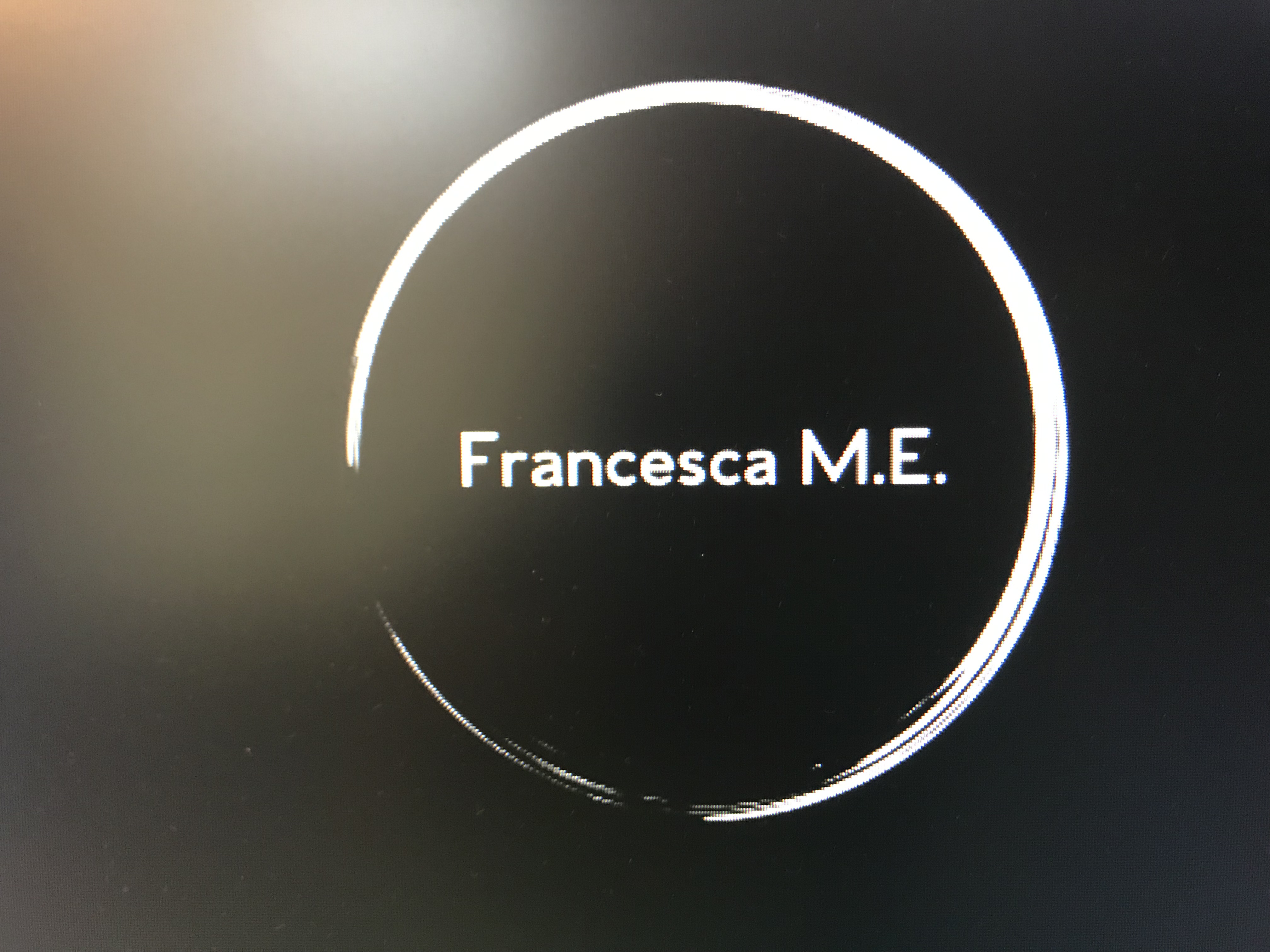Stuff
For many years, I accumulated stuff. The more we are alive, the more stuff we have. These last few months, I’ve come to realize just how much stuff I have. It’s overwhelming in the small house my husband and I share. We talk about our next house, which is going to have enormous closets and a lot more square footage to fit all our stuff so it has a place to reside unobtrusively to our eyes. I thought that was the answer until today.
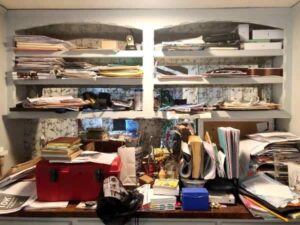
I had one of those “aha!” moments that Oprah coined. That’s not about learning a lesson as much as it is remembering that aha from inside yourself. That’s what it felt like today. The thoughts that had been picking at me to do something about the stuff can’t be ignored anymore.
In order to explain this blog adequately, I need to go back a little and explain why this is so important.
Some of the stuff I accumulated has to do with hobbies, like scrapbooking, paper planning, and sewing. I went down the rabbit hole a few years back buying all things Happy Planner. It’s a company that sells paper planners, stickers, and accessories to decorate your planner. I never thought of myself as having an addictive personality, but when I discovered the planner in 2017, I was on a quest to learn all things about Happy Planner from YouTube and buy all the things I could find, most on clearance, but always on sale.
It didn’t matter if it was in the budget; if I saw a great deal, I’d buy it. I was obsessed. It seemed like the perfect solution for me to keep organized and have a relaxing hobby with the stickers and stuff. A few years into it, I’d accumulated a lot of stuff that went along with decorative paper planning. I felt overwhelmed with not only the Happy Planner stuff but books everywhere, in every room except the bathroom, new things that didn’t have a proper home that just sat out, reminding me to do something with it.
Dawn from The Minimal Mom on YouTube explained the idea of the “silent to-do list” from the book Goodbye Things by Fumio Sasaki. This list involves having your thoughts cluttered by everything you want to get done and things around you. Even though we may think we don’t care about the messes or disorganization, worrying about our stuff takes our mental energy and “bandwidth,” as Dawn calls it. The answer is having less stuff. Of course, right?
I know now that the excess stuff around was distracting me from feeling pain. When we have a lot of stuff we’re compensating for something. For me, it was family and financial issues. I was hurting, and shopping and finding good deals took my focus away from that. I’d get a high feeling when I sourced out a Happy Planner sticker book for $2.00 (that I hardly used) and bought every one they had. I walked out of Michael’s like I was a genius for buying five $20.00 sticker books for $10.00. The elation lasted for a little while, and then I’d get the itch to find more deals. I’d hit Hobby Lobby, JoAnn Fabric, and Michaels in one day, all for the distraction so I didn’t have to face the sorrow and disappointment I had in my heart.
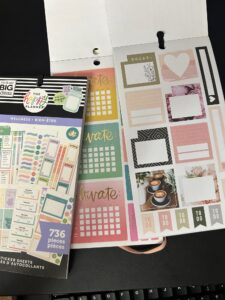
Before the Happy Planner phase, I bought books, clothes, house and garden items, and stationery products. Those things did bring me joy, but it didn’t last. I justified my purchases by telling myself I found a good deal and deserved it.
What did I deserve? Time-sucking activities to find a place for something new? Re-organizing a closet or my desk to fit the new stuff with the other underutilized stuff? I told myself I wanted to spend my time creating, not cleaning or organizing, but that’s not what I did. So, did I deserve not honoring myself for the sake of a new thing? I realized the answer was no.
If you’ve been there in that situation, you know how yucky it feels not to honor ourselves.
It’s all a coping mechanism. Any addiction or act that harms us in some physical or mental way is a coping mechanism. It’s a way our brains deal with our lives. We can only handle what our brains/minds allow us to handle. That’s why suddenly losing a loved one hurts so much. Our minds cannot process it. It needs time to re-wire the damaged parts to create a stronger sense of self.
We survive painful situations because our minds build new pathways that help us function. We can build pathways in our minds that lead to personal growth and happiness, or we can ignore the pain, keeping the same pathways going that require a substance to feel better. My substance was buying things.
I’ve stopped buying things I don’t need. I now make a mental note when I want to purchase something and ask myself if I am buying it to serve a purpose and make my life easier or if it will cause an uncomfortable feeling.
A few weeks ago, I looked at my desk at home, and it really hit me hard that the mess, the clutter, felt like it was there to insulate me. The outside was reflecting my inside: the clutter was my protection. I had things to occupy my mind and thoughts, so I didn’t have to look at myself and see that I didn’t want to be hurt anymore. I created a little fortress. 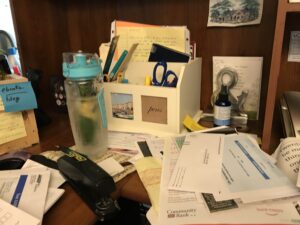
This is what my desk looks like now.
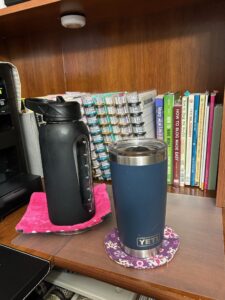
Wow! Writing these blogs is really unlocking doors in my head. I’m healing along the way, and I hope my journey inspires someone else who needs healing. I believe we all need healing, just to different degrees.
Stuff won’t help us heal. It can act like a bandaid to protect us for a little while, but the real magic happens when we face our deep, dark pain. It’s scary, I know. But continually living like this with stuff everywhere and feeling out of control is much worse—at least to me. At the end of the day, I just want to be happy.
Think about your stuff. Do you love it? Enjoy it? Use it? Or does it seem to act like a protective insulator so you don’t have to face your internal stuff? I realized that keeping clothes that didn’t fit me in my closet (that I believed was “inspiration” to try harder to lose weight) weighed me down, making me feel lousy about myself because I couldn’t fit into them. They went bye-bye. I deserve clothes in my closet that make me feel good about myself as I am now. Now is all we really have. The past is gone, and our future depends on what we do now.
Shake the clutter tree and get rid of things. Like Marie Kondo says, “Get rid of things that do not bring you joy.”
An easy way to begin to declutter our stuff is to get rid of one thing a day for a week. Have a box or bag on hand to put the items in, and at the end of the week, put it somewhere out of the way, but write a note and keep it somewhere you will see it that if in a week or a reasonable time frame if you don’t use those things, they go out of the house (donate, sell, recycle, or garbage.) See how that feels.
If you’re okay with that, keep going. The person who will be responsible for your stuff after you pass will be very thankful you paired it down instead of leaving it all for them to handle. Our treasures might be junk to another.
Thank you for reading this. We deserve a life full of joy and happiness. If you are struggling with those emotions, you are not alone. I write these blogs to inspire and offer ideas that have helped me feel more joy and happiness – and, most importantly, peace of mind.
To decluttering the castle,
Francesca
Created by a human for humans.
![]() 2024 – Francesca M.E. – All Rights Reserved.
2024 – Francesca M.E. – All Rights Reserved.
